If you’re building a brand, you’ll need a website, whether it’s a one-page portfolio or a full-on eCommerce store. But how much does it cost to build a website?
That’s inevitably one of the first questions you’ll have, but in truth, website development costs vary.
It all depends on how much work is required to build a website that suits your needs.
The good news is that you have plenty of options when it comes to choosing a website development process. The even better news is that this article breaks them all down for you.
From website builders to CMS platforms and bespoke designs, read on to find out how much a website costs when you start from scratch.
- These are the best web hosting services for your website
Criteria for understanding website building costs
To answer the question “how much does it cost to build a website?” as thoroughly as we can, let’s first identify some critical criteria.
However you choose to build a website, the main components are always the same: you’ll need somewhere to host it, a domain name, an interface, and tools to help people find it.
So why are website development costs so varied?
It’s down to how you build your site. You could use a website builder, take a more DIY approach and use a CMS platform, or opt for hiring a professional to do all the work.
To understand what web development route you’ll need to go down, here’s an explanation of each necessary website feature:
Website platform
At the start of your website development journey, you’ll be wondering, “how much does a website cost?” But let’s be more specific.
There are three main ways to create a website, and breaking down the development costs per option will give you the most informed answer. So we’ll be answering:
- How much does a website cost using a website builder? Users pay per month or per year to build and design websites without touching code with this option.
- How much does a website cost using a CMS? The highly flexible option, a content management system (CMS), and s open-source software for users with some experience.
- How much does a website cost using custom code? This option enables users to have a completely bespoke site but prepare to pay a massive premium.
Whether you want a completely custom website or you’re happy to work with website builders, every site needs a host.
Web hosting is where you store your website’s files on a server – essentially your website’s home – and you can pick from solutions like shared, VPS, or dedicated hosting.
You can find a web hosting provider to suit your requirements, but make sure that they offer the basics like an SSL certificate and plenty of storage space.
Here’s how you’ll have to approach hosting depending on how you create a website:
- Website builder – Hosting is included in the cost of using a website builder, so you won’t need to find a host.
- CMS – If you use a CMS like WordPress, you’ll have to source a hosting provider for your website.
- Custom code – Similar to using CMS, you’ll need to pay for a host, although often your web designers will find one for you.
Domain name
Just like physical locations, websites need addresses to be found. Your domain name is key to your site’s identity so whichever route you take, expect to pay for one.
You’ll have to find a unique domain name and register it with an ICANN-accredited domain registrar. A domain name is essentially rented, so factor the cost as an annual spend.
Domain name costs vary, and the extension most notably influences the price range – also called a top-level domain (TLD) – that you go for. Here are some examples:
- .com – The most popular and desirable domain name extension, .com is ideal for a business website, and you’ll probably need to pay a premium for it.
- .online – An affordable option, this TLD would suit a small business website or someone promoting their personal brand.
- .shop – This extension will set you back a few dollars per year and is ideal for an eCommerce website.
Design
Website design is just as important as the infrastructure of a site. Web design impacts how users perceive and interact with your website, so this part requires time and energy.
The cost to create a custom site design varies wildly depending on how you’re building a website in the first place.
In fact, your design requirements will often be the deciding factor in which route you choose – builder, CMS, or hiring a professional.
Here’s a brief estimate of website design cost across the three main options:
- With a website builder – There are no extra web design costs here. You pick a ready-made template and customize color, typography, and layout using intuitive drag and drop editors on a grid system.
- With a CMS like WordPress – As its open-source software, you get plenty of design freedom. Choose from thousands of themes to build a custom website. Sites like ThemeForest offer WordPress themes from $13 to nearly $4000.
- With a custom-coded website – The only limit is your imagination (and budget). The cost of creating a bespoke layout with a web designer depends on your branding needs and the level of complexity. Expect to pay upwards of $4000.
- Also check out our roundup of the best web design software
Functionality and features
If you’re building a business website, you’ll want the room to grow. So it’s essential to figure out early on how you can add extra functions and – more importantly – what that will cost.
Even a small business website deserves the best eCommerce functionality, blog or forum pages, and other exciting add-ons.
Like design, this aspect of website development can vary in complexity and, therefore, in cost. Here’s an idea of how functionality is added at all three levels:
- With a website builder – You’ll need to pay for an eCommerce plan to get necessary functions like a checkout and inventory planning. It’s all built-in, but you can add integrations like Facebook Shop and specific payment gateways.
- With a CMS like WordPress – Download and use plugins or extensions to get added functionality. While some plugins are free, premium options can cost up to $200. Open-source software is an ideal platform for bloggers.
- With a custom-coded website – To add eCommerce functionality like payment gateways, tax calculators, inventory management, and product pages, you’ll need to pay a premium development cost of around $10,000 upwards.

Marketing and SEO
You can’t rely on design alone to attract visitors to your website. Whether you’re running a business or showcasing a portfolio, you’ll need to pull some marketing strings.
Search engine optimization (SEO) is key to pushing your site to the top of search rankings, and it helps to use some of the best SEO tools to get you started.
Your marketing and website efforts won’t happen in a silo – you need an integrated toolkit to get people interested in your site pages. Here’s what you’ll generally require:
- With a website builder – A decent option will be optimized out of the box to improve SEO essentials like page load speed, plus you’ll get in-built tools like Google Tag Manager. You can also pay for marketing extras like pay-per-click (PPC) ads.
- With a CMS like WordPress – You can implement plugins like Yoast SEO or use some strategies to promote your business, like PPC ads or affiliate marketing. Alternatively, hire marketing assistance at an hourly rate.
- With a custom-coded website – It’s possible to factor marketing and SEO tools into your overall website development cost so that your website is optimized from the get-go. Or use a dedicated team or agency for an hourly fee.
- We've also featured the best onpage SEO tools
Website maintenance
Just like any finely tuned machine, websites should be taken care of after the initial web development stage.
Some essential tasks are required to maintain a website, from software updates to security checks and website backups. Here’s how involved you can expect to be:
- With a website builder – There are no website maintenance costs for you to take care of, as the cost of maintaining your site’s functionality is built into your plan.
- With a CMS like WordPress – You can set your site to update its core functions automatically, add plugins to do the work, or hire a service.
- With a custom-coded website – You can often factor maintenance into your website development cost, but if not, an IT specialist can help at an hourly rate.
Cost of building a website with a website builder
Website builders have revolutionized the online experience for everyone who wants to have a presence on the internet.
Easy and affordable, these platforms are built to be used by anyone who wants a website or online store. So, how much does it cost to build a website with a website builder?
There are several options available – let’s check out some of the key players:
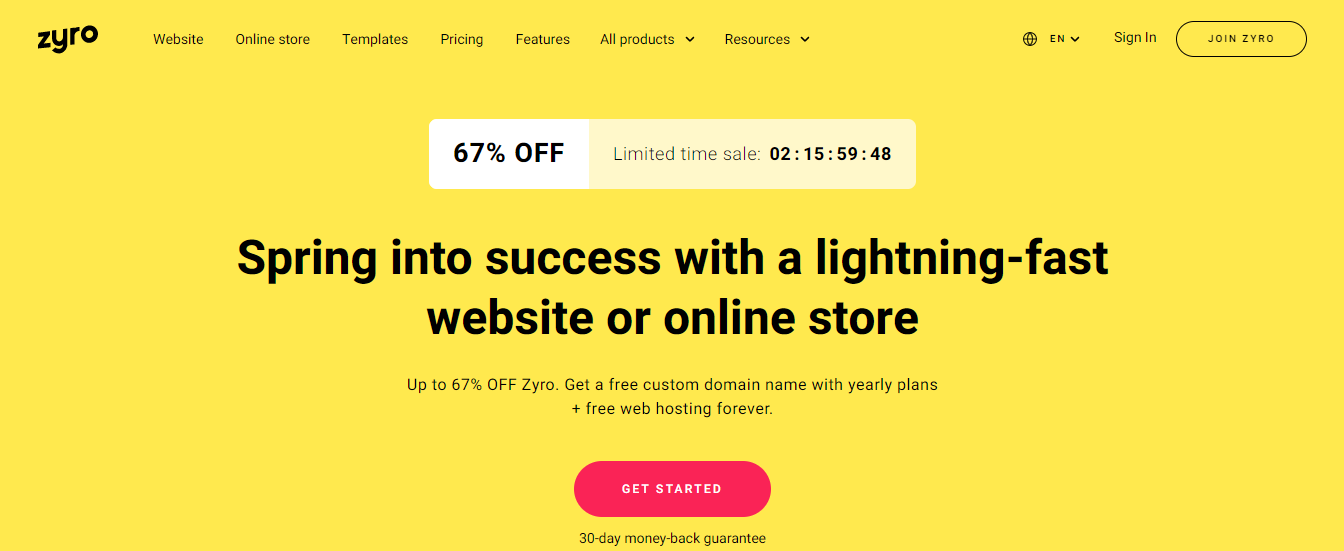
Known for speed and an impressive AI toolkit, Zyro offers four price plans for business and eCommerce websites, starting from $23 up to $30 per month.

With over 500 design templates and packed with features, Wix has three price plans. A business website plan will cost you upwards of $23 per month.

With a more complex interface but just as feature-packed, using Squarespace to create a business website costs $18 per month, while an eCommerce plan is $26 per month.
Website platform
With minimal exposure to the website development side of things, it’s tempting to think that this option won’t get you a high-quality, fully custom site.
But website builders are designed to take care of the more complex parts of web development so that users with any level of experience can get online.
Web hosting is taken care of, users don’t have to touch any code, and quality builders like Zyro, Wix, and Squarespace give each site a free SSL certificate.
Because a team of specialists has taken care of the development, your website is SEO-friendly to get online and mobile-optimized right away.
If you’re more familiar with website development, or you want to have a feature-rich, completely bespoke design, website builders may not be for you.
While the web design is always customizable, this option doesn’t offer the flexibility of a CMS platform or a custom-coded site.
This option is ideal for users with small budgets, limited or no coding experience, and people who need a custom website for a small business or online store.
If you go down this route, website pricing is pretty straightforward. The cost of the platform is often the only cost you have to consider until you market your business.
Based on Zyro, Wix, and Squarespace, the average cost is $21/month for a business website or $26/month to set up an online store.

Domain name
There’s no way to avoid having a domain name, although you’ll want one. It will help your company stand out and be memorable – just make sure you’re ready to pay for it.
By default, you’ll likely get a domain connected to the builder you’re using, like .zyrosite.com, for free. But website builders give you other options.
Most platforms offer a free domain for one year on their business and eCommerce website plans. You can also connect existing domains to your new website.
Zyro is a great example of a site builder that offers tools to help you with domains. They provide a free domain name finder and generator, as well as bespoke TLDs, including:
- .online, .store, .xyz – these typically cost $0.99/year.
- .shop – ideal for an eCommerce website, it’ll cost $2.99/year.
- .com, .org – if you’re lucky to get one of these, it could cost you $8.99/year.
Design
Everyone should end up with a unique website design, whichever option they choose. If the idea of spiraling design costs fills you with anxiety, this might be the solution.
Website builders offer a diverse range of editing tools for their users. Rather than paying a team of designers, creative control is given to the website owner.
You’ll pay nothing beyond the initial website creation cost – there are no added design costs or premium themes here. Instead, all tools are built-in, and users decide how their websites look.
Builders like Zyro offer intuitive drag and drop editors, hundreds of designer-made templates, and AI tools like logo makers and text generators.
While you can completely personalize your site, there’s no option to add themes or third-party templates. So, if you don’t like any design option on the platform, you’re stuck.
If you want more sophisticated web design features, like bespoke parallax scrolling or motion animation, a website builder might feel too basic.
Functionality and features
Because you’ll be signing up for a plan, you can choose how functional you want your website to be with a website builder platform.
Designated eCommerce website plans are available with most builders, including Zyro, Wix, and Squarespace. These are loaded with all the tools needed to create an online store.
Whether you want to expand your existing company or launch a new business, the tools to build a website with eCommerce functionality are all there for you.
Let’s use Zyro as an example again – here’s what you can expect on an eCommerce plan:
- Multiple payment gateways, the option to add discount coupons, and in-built shipping and sales tax calculations.
- Integrations to Facebook Shop, Instagram Shop, or Amazon.
- Zero commission on transactions.
- Inventory management dashboards abandoned cart notifications to get online and up to 2500 products.
Pros
eCommerce functionality is built in as standard if you opt for a specific pan, so there’s no added cost to build in necessary features.
As long as your design is great, the end-user will get a fluid shopping journey from landing page to checkout. Plus, you, as the business owner, will be given solid management tools.
Some builders charge commission fees per transaction on an eCommerce website. For example, Squarespace takes 3% unless you upgrade to a more premium plan.
Similar to website design, if you’re after bespoke features and elements, it’s probably worth committing to a bespoke website development cost instead of using a builder.
- These are the best shopping cart software solutions for your online store
Marketing and SEO
If you haven’t already guessed, one of the main advantages of site builders is that they get you online quickly. That way, you can focus on building your company.
With that in mind, your website is equipped from the start with the basic tools to get it noticed. It’s up to you to find your target audience, but you’re given a head start.
Depending on your business objectives, you’ll need to build a marketing strategy that likely includes extra costs, like paid ads and a premium SEO toolkit.
That said, builders set you up with search-optimized websites and integrations to help you track and improve performance, such as:
- Google Tag Manager and Google Analytics.
- Social media integrations to provide an omnichannel experience.
- Content creation tools, for example, Zyro’s AI Writer to help optimize website copy.
Website maintenance
Good news: there are no maintenance costs or tasks to consider when you opt to build a website with a builder platform. Everything is included in the price of your plan.
Cost of building a website with a CMS
Starting life as a blogging platform, WordPress is now the most popular content management system (CMS) in the world. But what is a CMS, and are there other options?
In short, a CMS is what it says it is: software that enables multiple users to create and manage content online. It offers endless possibilities for creating a custom website.
So, how much does it cost to build a website with a content management system? Let’s take a look at a few examples:
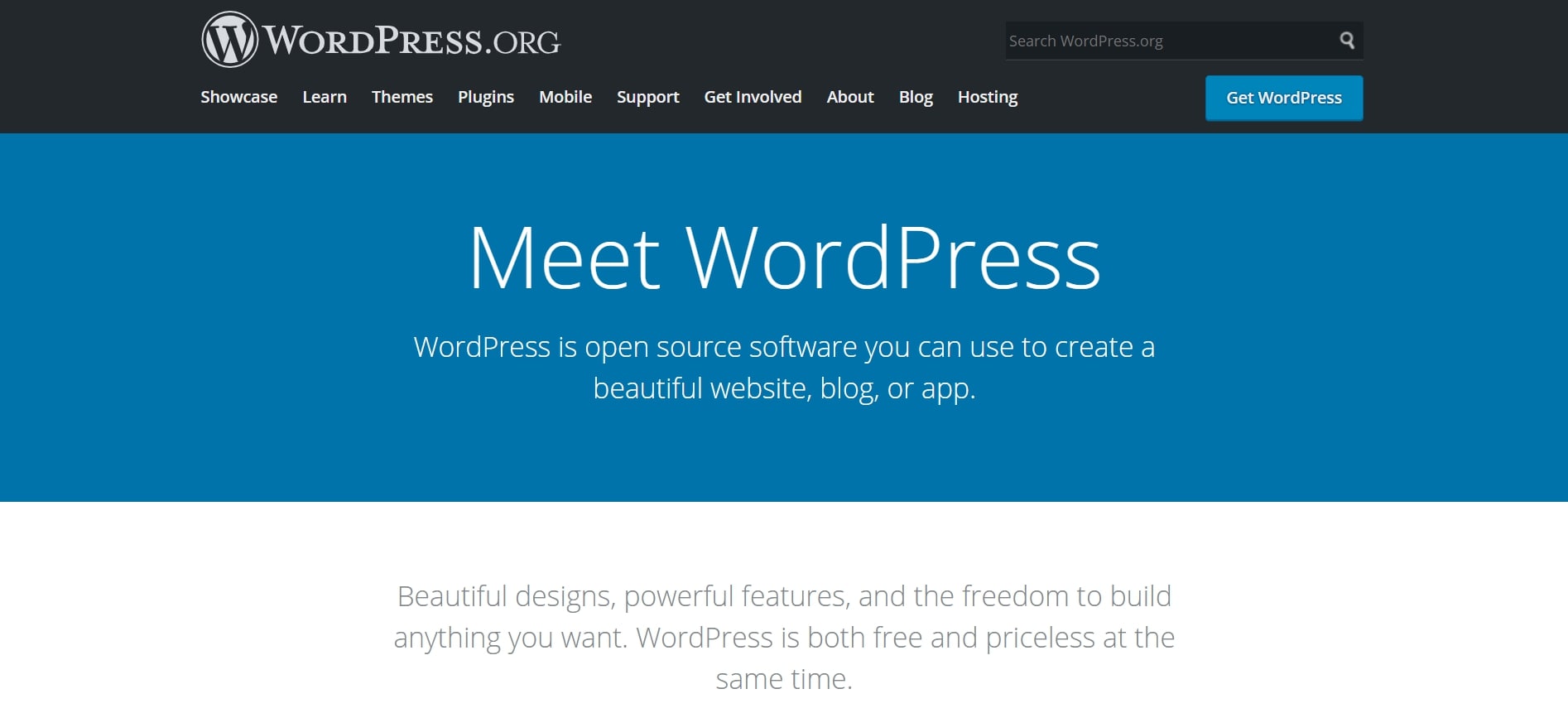
- WordPress – Used globally for company and personal websites, WordPress is free to use but will cost money to build with.
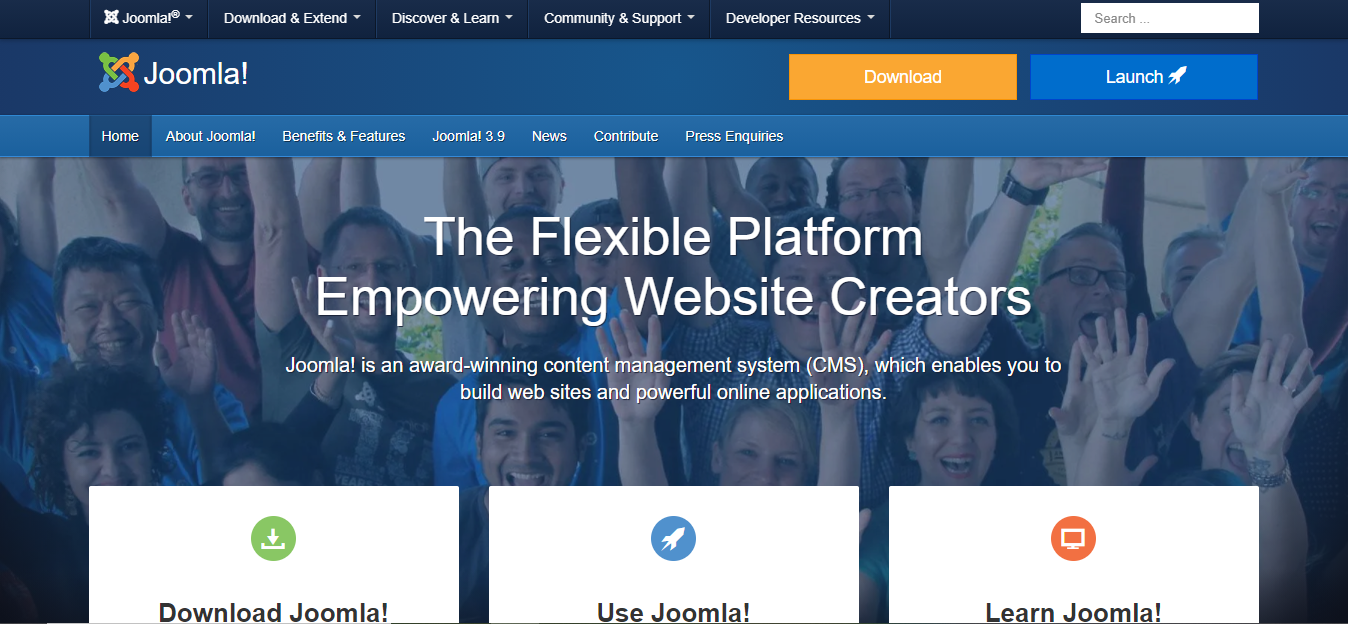
- Joomla – Also free to download and use, Joomla requires a bit more web development knowledge to get a website up and running.
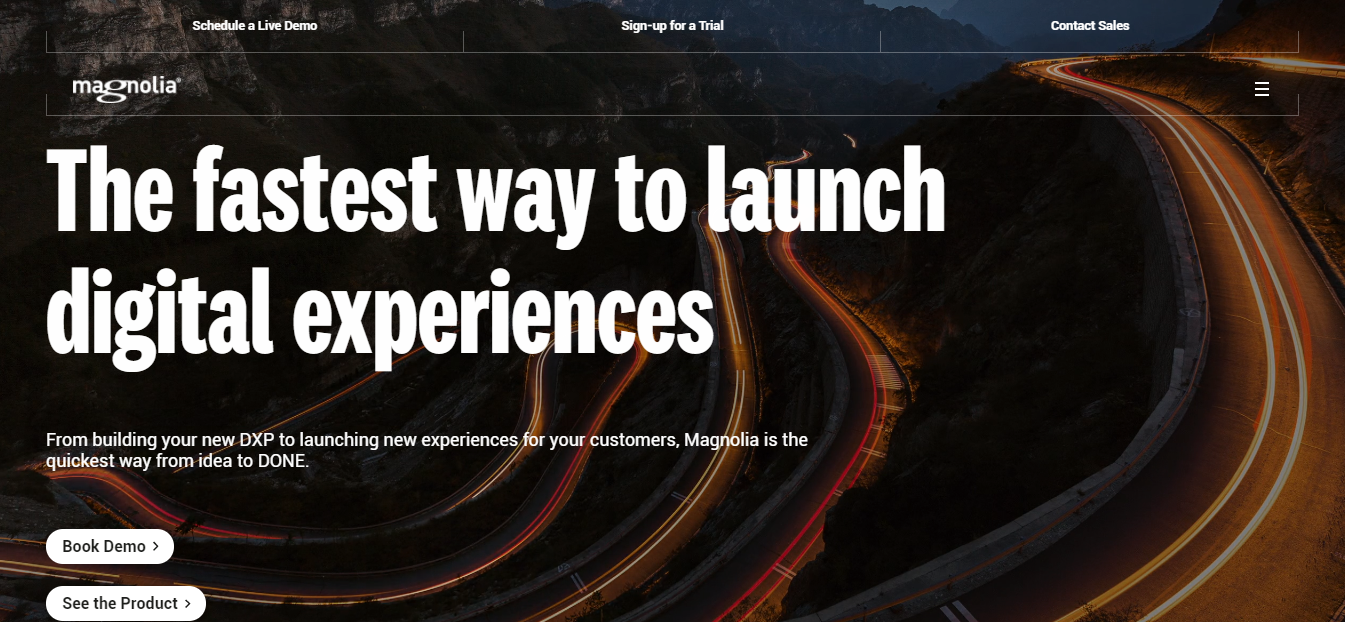
- Magnolia – More business-focused and a secure option, Java-based Magnolia is ideal if you want to grow a company website. It’s also free to start with.
- Check out our complete list of the best CMS
Website platform
So, if CMS platforms are free to set up, why isn’t everyone using them? Well, there are two key reasons: the learning curve and the added costs.
When it comes to the WordPress vs. website builder debate, builders win points for simplicity, while WordPress and other CMS options stand out for being flexible.
If you use WordPress or its competitors, you’ll need to find your own website hosting provider to start with. You’ll have options, like VPS, shared, or WordPress hosting solutions.
When it comes to finding web hosting, it pays to choose a provider that offers a package of necessities like an SSL certificate and tons of storage. Here are some examples:
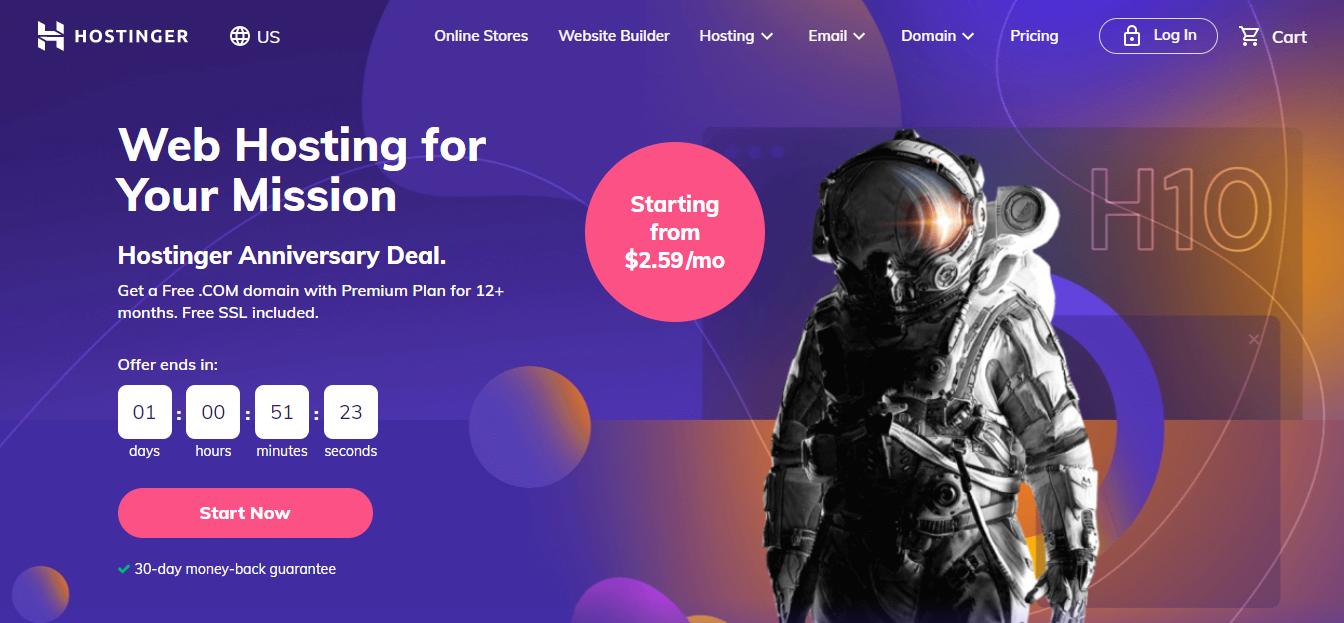
- Hostinger – For around $15/month, you can get dedicated WordPress website hosting with a free SSL certificate, unlimited bandwidth, and daily backups.

- Bluehost – You can get a similar package for your WordPress site from upwards of $12/month with access to custom themes.
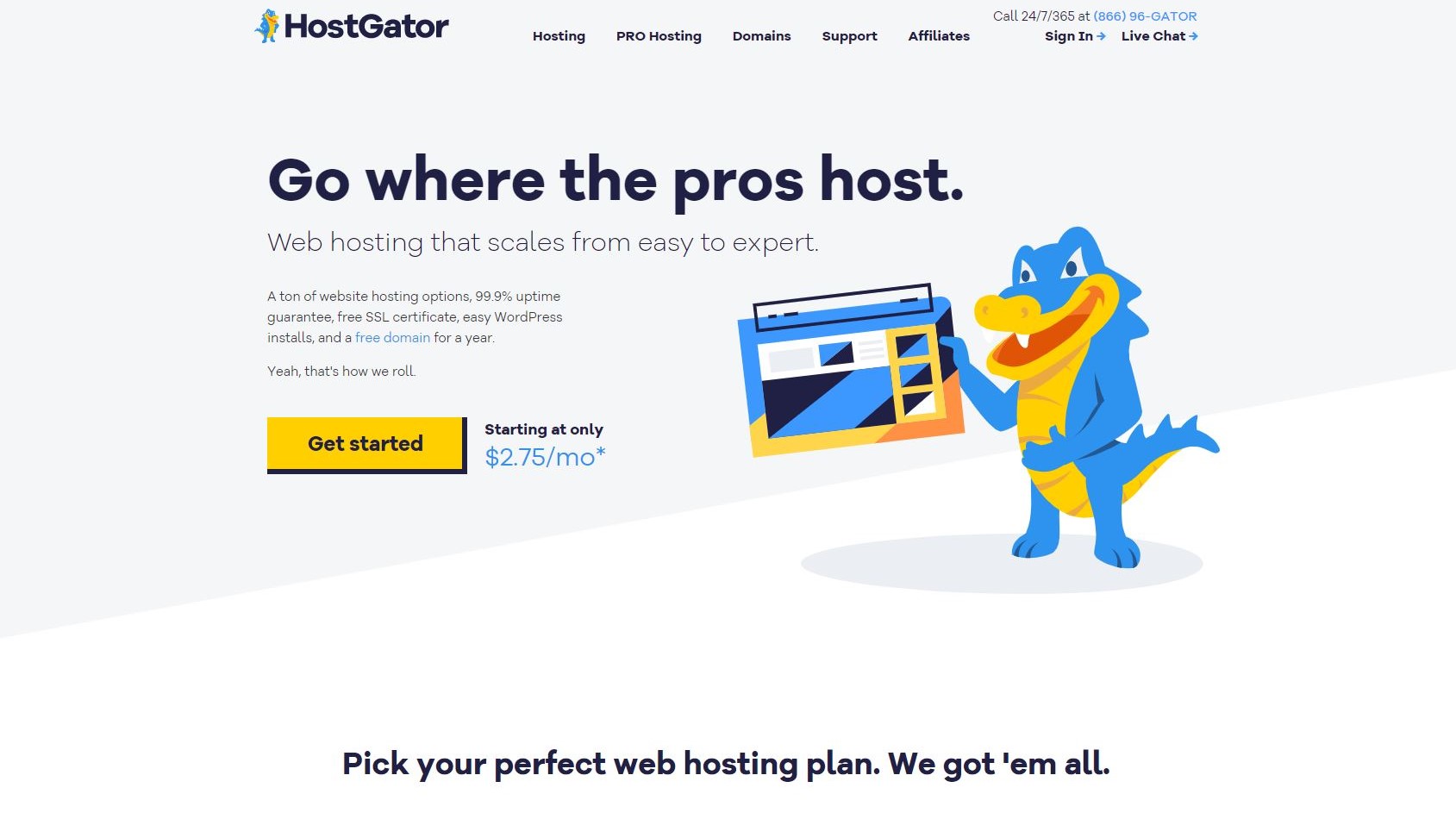
- HostGator – This platform’s WordPress hosting plans start from $6/month as an introductory offer, and include themes, too.
Who’s it for?
Most web hosting companies offer free WordPress installation, but it’s a manual job. With that in mind, CMS solutions are best for users with some website development experience.
Hosting aside, the user interface on platforms like WordPress takes some getting used to. You’ll get tons of flexibility, but an understanding of technical terms is recommended.
Just as with a website builder, you’ll need to pay for and register a domain for your site to make sure that the end-user can find you.
Whether you’re getting a website for a small business or you want a personal blog, you’ll need to get this task out of the way before you start building.
Many hosts will provide you with a free domain for one year when you sign up for one of their plans, with the price going up to the standard rate after this period.
You can pick a TLD that suits your website needs as well as your budget – expect to pay:
- .com – Around $8.99/year for this popular extension.
- .tech, .online – $0.99/year to get a more unique TLD.
- .live, .digital – About $3.50/year to use these extensions.
Design
WordPress is probably the right solution for you if you want to create a genuinely unique website with limitless customization opportunities.
The web design stage is where you’re likely to see costs increase – CMS platforms allow you to add themes, plugins, and extensions to suit your exact preferences.
Although every WordPress website has access to built-in themes and an editing interface, the most versatile way to design your site is by using custom themes.
Choosing the right theme is a matter of opinion. They usually cost a yearly fee, or they’re ‘freemium’ – free to begin with.
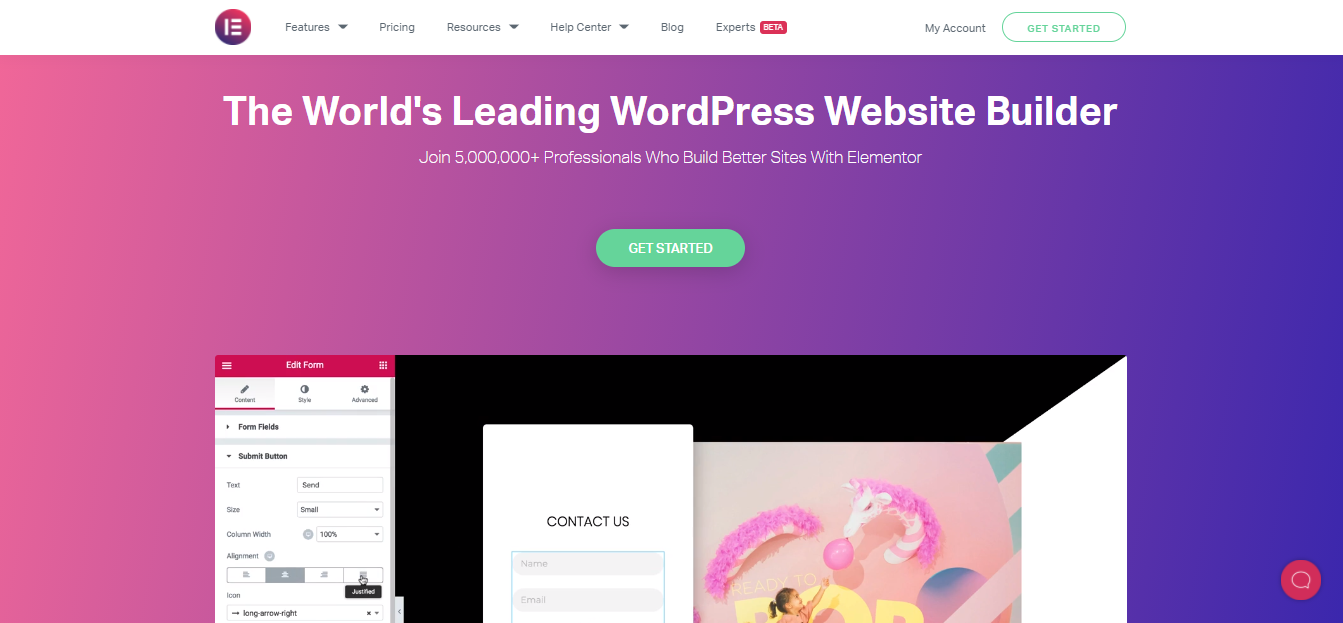
A lot of themes will work with page builder plugins like Elementor and landing page builders like HubSpot, which have a similar interface to dedicated builders.
What does it cost?
Despite CMS platforms being free to get started with, your website cost will likely be influenced by the custom themes you choose.
The average cost of a premium third-party theme for WordPress is around $50 per license, but you could pay up to $200.
Functionality and features
If you’re using WordPress to build a business website, costs for plugins should also factor into your budget. It’s up to you to create your most effective toolkit.
Alongside eCommerce functionality, you’ll need to consider how to optimize your website for SEO, security, and analytics.
Similar to custom themes, you can shop for plugins either directly on WordPress or through third-party websites.
There are a few ways to install plugins on your website, most of which require a level of web development knowledge. But you don’t have to guess the process by yourself.
As WordPress is so widely used, refer to YouTube tutorials or the vast community of users for help with installing your new plugins.
You’ll have access to thousands of free WordPress plugins, although there are plenty of paid-for options. Expect to pay anywhere from $13 - $4000/year for these.
There are some powerful free plugins, like WooCommerce, which will help you et a functional eCommerce site with a flawless checkout process.
Marketing and SEO
Another likely CMS website cost component is your marketing toolkit. As with your web design, this is something you’ll need to build yourself or with a team of experts.
Do your research to find the best WordPress SEO plugins and marketing aids, and make sure that you have a plan in place – the more plugins you add, the higher the spend.
There are a few key ways to work on the marketing side of your online business. Of course, you can always pay for business analysts to do the job for you.
If that doesn’t appeal, here are some marketing and SEO solutions for your WordPress site:
- Install a landing page builder like HubSpot (from $45/month) to get help with maximizing your website’s impact and analyzing user behavior.
- Add freemium WordPress plugins like YoastSEO or implement paid-for tools like Ahrefs for upwards of $99/month.
- Use social media marketing and embrace affiliate marketing, paid ads, and freemium email campaign plugins.
Website maintenance
It’s free to update your core software on CMS platforms like WordPress, although you will need to stay on top of regular maintenance like site backups.
As with most things related to WordPress and its competitors, you can use plugins to manage website maintenance. These can cost from around $7/month to $70/year.

Costs of building a custom coded website
If you’re scaling a large company, are prepared for extensive website costs, or want to make a website unlike any other, this option is for you.
Building a website from scratch is an extensive piece of work, and usually requires a team of experts unless you are a fully competent generalist web developer.
So, how much does it cost to build a website using a web designer or developer?
Let’s start by noting that there is a difference between developers – who code your website and add functions – and designers who take care of the user interface.
You’ll need to find the right people to deliver what you want, whether that’s a developer, a designer, or an agency that can manage the entire project.
With a custom-coded website, the platform is either built manually or on a CMS. If you hire a company to make your site, you can get on with other business tasks in the meantime.
You will also end up with a website that matches your particular requirements, eliminating any of the potential frustrations that come with using plugins or built-in editors.
This is by far the most expensive way to get a website. Cost estimates for custom-coded sites start from around $5000 upwards.
You will also still need to get and pay for web hosting on top of the platform. This is often factored into the website development price, but you might not get a choice of host in this case.
Unless you have a healthy budget for building a personal brand (perhaps you’re a social media influencer), custom-coded sites are ideal for larger businesses.
This is a big investment with a big initial platforming outlay. It will, however, save you time to do other things while your website is being built to spec by professionals.
To get someone to make a website from scratch can cost anything from $5,000 to $30,000. It depends heavily on the scope of your needs.
You will need to get VPS hosting, which is available from companies like Hostinger, Bluehost, and Hostgator. The average cost is around $20/month.
SSL certificates will either be included in hosting packages, or you can pay separately for around $200/year.
As always, you need to get a domain before starting your online journey. If you’re spending a lot on your site, it’s worth paying for a .com TLD and using your exact business name.
This is a general rule for domains: your website address needs to be memorable, so using the name of your brand as it appears on packaging or social media is the goal.
Unless you want to buy a really sought-after domain, prices for TLDs are usually similar wherever you shop for them.
There’s the chance you’ll get a free one-year domain with your hosting package, but expect to pay between $8.99 - $15 per year after that.
The beauty of paying for a custom-coded website is that you can create whatever kind of layout you want – as long as it looks good and is functional, of course.
You can approach your website design in a number of ways: hand the whole thing over to a designer, create a detailed brief and get help building it, or do everything yourself if you can.
It helps to start with a design brief that comes from you. If you’re stuck for ideas, a consultant can advise and pad out your web design with you, but bear in mind that this costs money too.
Look for freelance web designers on sites like Fiverr or Upwork, where you can hire someone for a rate of around $20 - $80 per hour, depending on their skill set.
Enlisting the help of a design agency will set you back anywhere from a few hundred dollars to $10,000 for a complex, multi-page, feature-heavy website.
Using freelancers is generally more affordable as you can pay up to $80 per hour, or ask for a customized template for around $300 - $600.
One of the most variable components when it comes to building a website, the level of features and functionality depends on your requirements.
If you want an eCommerce store, this will add another layer of complexity to your website build, and it’s well worth hiring a developer to manage the workload.
If your custom site is being built on a CMS like WordPress, your developer can select a range of plugins to add functionality to the website.
Alternatively, elements like payment gateways, tax calculators, and inventory management tools will have to be added manually.
As with the CMS solution, if you’re adding plugins expect to pay up to around $100 on average for necessary eCommerce functions.
If you need a custom online store and it’s being built from scratch, expect to hand over around $10,000 for the project.
It’s likely that you’re prepared to run solid marketing campaigns with allocated budgets if you’re already investing in a custom-coded website.
Your web developer can implement SEO tools and integrations, but you’ll need to strategize for managing conversion rates – after all, you’ve paid for an incredible website.
There’s the do-it-yourself approach to marketing and SEO: undertake keyword research, use pay-per-click ads for around $3 per click, and embrace social media marketing.
Alternatively, recruit an agency to manage your company’s marketing efforts. This will cost you anywhere from $100 - $250/hour.
Unless you’re a development pro or using WordPress as your platform, it’s best to pay for professionally managed website maintenance.
Often, developers will factor ongoing maintenance into their contracts. If not, schedule an IT expert to provide maintenance services and expect to pay around $100 per hour.
- These are best laptops for programming on the market
The price of building a website
So, how much does it cost to build a website?
As you will have noticed, there’s no concrete answer. With so many options and variables, it all depends on what you need and how you choose to approach website building.
Let’s recap on the three main options, and what you can generally expect to pay:
The most simple solution, you’ll pay one yearly cost for your plan and (after your first year) an annual domain fee. This is ideal for beginners and low budgets.
Based on Zyro, Wix, and Squarespace, the average cost of building a website with a website builder is $21/month or $26/month for an eCommerce site, plus up to $10/year for domains.
With more of a learning curve, platforms like WordPress are free to start with and flexible to build. They’re ideal for more experienced users.
Factoring in hosting, a domain, themes, and plugins, you could pay an average of $10 to $100 per month for a CMS-based website.
A project you can completely hand over to professional developers, this solution works best for users with large budgets and specific needs.
Depending on your requirements, expect to pay between a few hundred to $10,000 upfront, with ongoing costs including security, maintenance, hosting, and marketing.
- We've also featured the best small business website builders
source https://www.techradar.com/news/how-much-does-it-cost-to-build-a-website/
0 Comments:
Post a Comment